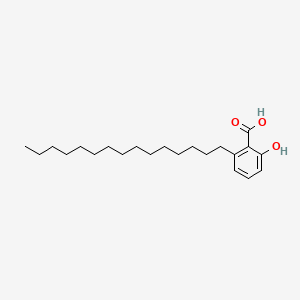| Authors | Title | Published | Journal | PubMed Link |
|---|---|---|---|---|
| Mantelingu K et al. | Activation of p300 histone acetyltransferase by small molecules altering enzyme structure: probed by surface-enhanced Raman spectroscopy. | 2007 | J Phys Chem B | pmid:17417897 |
| Green IR et al. | Molecular design of anti-MRSA agents based on the anacardic acid scaffold. | 2007 | Bioorg. Med. Chem. | pmid:17601740 |
| Eliseeva ED et al. | Characterization of novel inhibitors of histone acetyltransferases. | 2007 | Mol. Cancer Ther. | pmid:17876038 |
| Philip JY et al. | Preparation of molecularly imprinted polymers using anacardic acid monomers derived from cashew nut shell liquid. | 2007 | J. Agric. Food Chem. | pmid:17927136 |
| Green IR et al. | Design and evaluation of anacardic acid derivatives as anticavity agents. | 2008 | Eur J Med Chem | pmid:17959274 |
| Kishore AH et al. | Specific small-molecule activator of Aurora kinase A induces autophosphorylation in a cell-free system. | 2008 | J. Med. Chem. | pmid:18215015 |
| Muscari C et al. | Difluoromethylornithine stimulates early cardiac commitment of mesenchymal stem cells in a model of mixed culture with cardiomyocytes. | 2008 | J. Cell. Biochem. | pmid:18240140 |
| Sung B et al. | Anacardic acid (6-nonadecyl salicylic acid), an inhibitor of histone acetyltransferase, suppresses expression of nuclear factor-kappaB-regulated gene products involved in cell survival, proliferation, invasion, and inflammation through inhibition of the inhibitory subunit of nuclear factor-kappaBalpha kinase, leading to potentiation of apoptosis. | 2008 | Blood | pmid:18349320 |
| Cui L et al. | Histone acetyltransferase inhibitor anacardic acid causes changes in global gene expression during in vitro Plasmodium falciparum development. | 2008 | Eukaryotic Cell | pmid:18487348 |
| Souto JA et al. | Synthesis of benzamides related to anacardic acid and their histone acetyltransferase (HAT) inhibitory activities. | 2008 | ChemMedChem | pmid:18537201 |
ANACARDIC ACID
ANACARDIC ACID is a lipid of Polyketides (PK) class.
